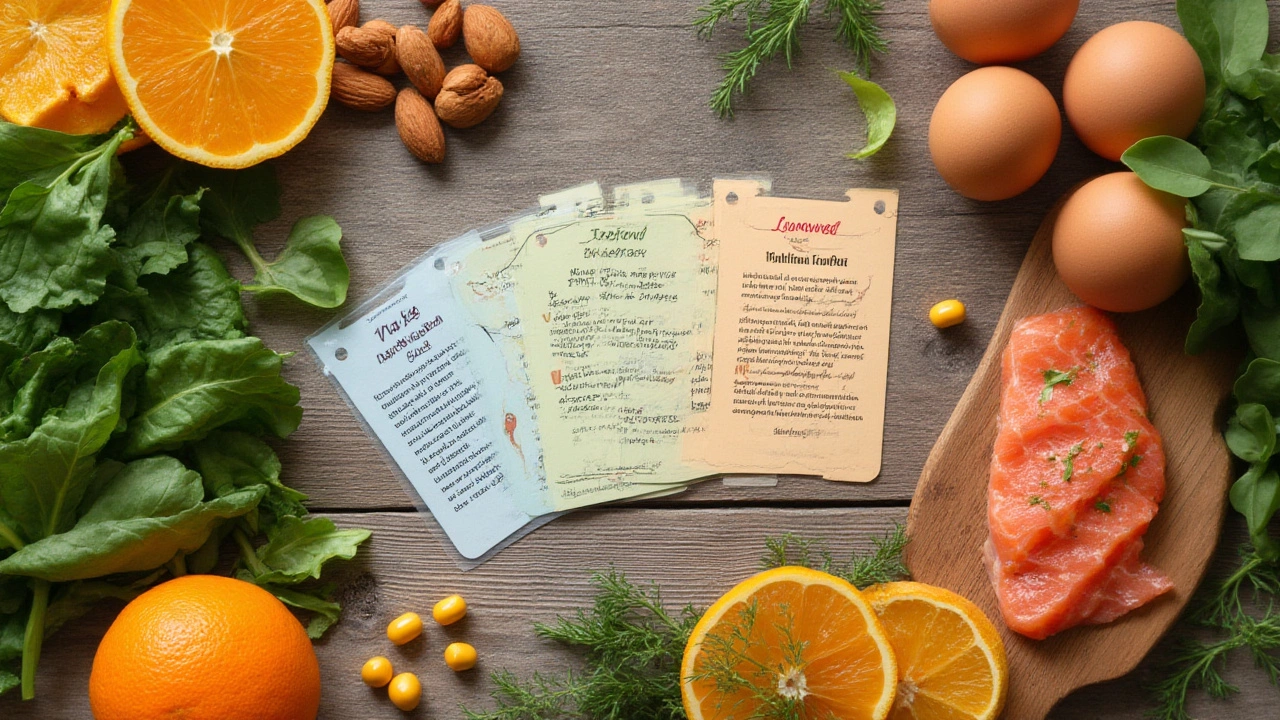You probably don’t give much thought to something as tiny as a vitamin, but your body sure does. Ever wondered why your energy crashes even before your third coffee? Or why your skin suddenly looks tired or your immune system seems on vacation? Sometimes, the answer is hiding in the simplest things — the basic vitamins you learned about back in school but maybe forgot about since. Turns out, these tiny nutrients do a heck of a lot more than just take up space in your multivitamin bottle.
Why Vitamins Matter More Than You Think
If you see vitamins as just another health marketing trick, check this out: your body can’t make most vitamins alone (except for some like vitamin D, but even that needs sunlight). Miss out on enough, and even small deficiencies can snowball into problems like fatigue, slow wound healing, brittle hair and nails, or weak immunity. That’s not hype — a study by the CDC in 2022 showed nearly 10% of Americans were short on at least one essential vitamin, with vitamin D, B12, and iron topping the charts.
See your body like a high-performance engine. Skip the right fuel, and even the fanciest sports car won’t get far. Every vitamin has its “specialty” — vitamin C is all about skin and immune defense, vitamin A keeps your eyes sharp at night, the B group keeps your brain humming and energy burning. Forget myth — vitamin E isn’t just for beauty creams; it helps mop up cell-damaging free radicals, lowering risk of long-term diseases. Without enough of these, little breakdowns add up over weeks and months. That foggy head after lunch? Or your muscles feeling heavy for no reason? Vitamin issues could be the sneaky culprit.
Not convinced yet? Look at scurvy — yes, the pirate disease. It comes from a total lack of vitamin C, and while you’re probably not stuck on a 17th-century ship, research in the UK found that low but not-zero vitamin C still cranks up tiredness and weakens immunity. These aren’t ancient issues. Vitamin D, for example, is still wildly under-consumed, especially in cloudy cities or if you wear lots of sunscreen. People chalk up their bad moods or achy bones to stress or age, but sometimes it’s as simple as a vitamin D shortage bringing the blues.
Here’s the kicker: fixing a missing vitamin isn’t like flipping a switch overnight, but the benefits can sneak up. Good levels of B12 and folate have been closely linked with sharper memory as you get older, and women need more iron and calcium than men — not because anyone says so, but due to actual body chemistry and bone structure. Translation? If you ignore vitamins, your body finds a way to remind you.
The Vitamins That Pack the Biggest Punch
Let’s look at where each essential vitamin quietly takes charge. There are 13 vitamins everyone needs on a daily or near-daily basis. Split broadly, they’re in either fat-soluble (A, D, E, K) or water-soluble (B-complex, C) camps. Fat-soluble vitamins tend to stick around in your body’s tissues, so taking too much isn’t a great plan, but for water-soluble ones, what you don’t use gets flushed out. If you skip eating them often though, your “tank” empties fast.
Vitamin A is a double act: it gives eyes their night vision superpowers and strengthens your immune system — a diet rich in carrots, sweet potatoes, or spinach helps here. Vitamin B1 (thiamine), B2 (riboflavin), and B3 (niacin) are your go-to for burning carbs and making energy — it’s why cereal boxes are always “fortified” with Bs. B6 and B12 are all about memory, nerves, and balancing moods. Missing these leaves you feeling foggy or jumpy. B12 is especially tricky, as it’s only found in animal foods, so vegans need to supplement.
Vitamin C isn’t just for colds — it helps build collagen for skin and speeds up recovery from workouts or minor injuries. Citrus fruits are a classic source, but strawberries and bell peppers actually pack more C per serving. Vitamin D is the odd one — it’s technically a hormone, produced after sun exposure, but most people fall short if they work inside or live in northern locations. Vitamin D helps absorb calcium for strong bones and keeps your muscles and mood in check.
Vitamin E works behind the scenes to keep skin looking healthy and acts as an antioxidant, potentially lowering the risk of chronic diseases. Nuts, seeds, and plant oils are loaded with E. Last on the fat-soluble list: vitamin K. While it’s less flashy, it helps blood clot properly and teams up with vitamin D to build bones. Leafy greens like kale and broccoli are vitamin K powerhouses.
| Vitamin | Main Benefit | Easy Food Source |
|---|---|---|
| Vitamin A | Eyesight, Immunity | Carrots, spinach |
| Vitamin B12 | Nerve Health, Energy | Eggs, meat |
| Vitamin C | Immunity, Skin | Oranges, bell peppers |
| Vitamin D | Bones, Mood | Sun, fortified milk |
| Vitamin E | Antioxidant | Almonds, sunflower seeds |
| Vitamin K | Blood Clotting, Bones | Broccoli, kale |
Each vitamin has its sweet spot. Overdo it (like loading on vitamin A through reckless supplements), and you risk toxicity — especially true for fat-soluble ones. Always focus first on food, not mega-doses in pill form.

Sneaky Signs You Might Be Missing Key Vitamins
Most people never spot a vitamin deficiency until it smacks them in the face. It doesn’t have to be dramatic, like gums bleeding from lack of vitamin C or blurred vision due to low vitamin A. Symptoms start small — brittle nails, recurring mouth ulcers, tingling in the fingers or toes, or frequent colds can all be early warning signs. Your sleep suffering? That could be a B6 or magnesium gap. Trouble focusing at work even after a decent night’s rest? B12 or iron might be the problem.
One weird one: cracked corners of your mouth, like paper cuts that won’t heal, often mean low levels of B2 or B3, especially in people with restrictive diets or digestive issues. Vegans and vegetarians who don’t watch their vitamin B12 intake sometimes develop numbness, confusion, or fatigue — those symptoms creep up slowly. Older adults absorb vitamins from food less efficiently, especially after age 50. That’s why doctor visits in your 60s often include blood tests for B12, D, and folate.
Another overlooked clue is changes in mood, such as anxiety, irritability, or even mild depression. Research in 2023 out of Harvard found that among office workers who rarely got sun, vitamin D levels below 30 ng/mL correlated strongly with more days feeling low or tired. Kids and teens can show vitamin D shortages as restless sleep, muscle aches, or frequent infections, which teachers or parents sometimes miss amid busy schedules.
Let’s be real — nobody’s eating perfectly every day. If you burn the candle at both ends, skimp on veggies, or rely heavily on processed stuff, you’re at a bigger risk. Stress, cutting calories for weight loss, or medical conditions like Crohn’s or celiac disease crank up your need for certain vitamins, too.
Here’s a quick checklist of surprising red flags:
- Struggling to remember names, places, or tasks? Could be low B12, folate, or D.
- Getting sick every month? Your immune system loves vitamin C, zinc, and vitamin D.
- Eyes super sensitive to bright light? Long-term vitamin A shortage.
- Hair thinning, especially at the crown? Often tied to iron, B vitamins, and vitamin D.
- Cuts or bruises healing slowly? You might need more vitamin C or K.
The only way to know for sure is blood work, but tuning in to how you feel can tip you off before things get too far.
Making Vitamins Easy: Get More from Every Meal
Think getting enough vitamins takes fancy food or expensive supplements? Not at all. Start by playing the "color game" on your plate. The more colors — dark leafy veggies, bright peppers, berries, orange sweet potatoes — the wider the vitamin net you cast. Swapping white bread for whole grain gives you bonus B vitamins. Bonus: fresh or frozen veggies keep nearly all their vitamin punch, so you’re not stuck with expensive farmer’s market salads.
For breakfast, add berries to oatmeal instead of just dumping on sugar. A spinach omelet covers vitamin A, E, and B12 in a single meal. Nuts are tiny vitamin powerhouses: a handful of almonds delivers half your daily vitamin E, and sunflower seeds are packed with B6 and E. Not a dairy fan? Fortified soy or almond beverages give you calcium and vitamin D, without the lactose troubles.
If you stick with a standard diet, you’ll usually get most of your vitamins — but if you’re vegan, vegetarian, following keto, or just picky, you might need help from supplements. Read labels for doses that fill in gaps—don’t just buy mega-doses that promise more than your body can use. For example, most adult men only need 900 mcg of vitamin A per day, but some supplements push 3000 mcg — not necessary unless a doctor finds a deficiency.
Cooking tip: water-soluble vitamins like C and B fade with too much heat. If you boil veggies until mushy, you lose a chunk of their vitamin help. Steam, roast, or eat them raw when possible to lock in nutrients. If you’ve got little kids or picky teens, blend spinach or kale into a smoothie — the fruit flavor usually hides the taste.
Keep a vitamin tracker on your phone if you tend to forget what you ate. Apps like Cronometer or MyFitnessPal show actual micronutrient data per meal, not just calories. Add in sunlight whenever possible — even 15 minutes a day on your arms and face (without sunscreen, but not so long you burn) can boost vitamin D levels naturally for most people.

Smart Supplementing: When Food Alone Isn’t Enough
Let’s settle the supplement debate: most people do just fine on food alone — but there are real moments where a vitamin pill can be a game-changer. If you’re elderly, pregnant, vegan, have digestive issues like IBS or Crohn’s, or you’ve had weight-loss surgery, your baseline needs are different.
B12 deserves special mention. Anyone eating little or no animal foods (vegans in particular) should always supplement B12. It’s almost impossible to get enough from plants alone. Pregnant women need extra folic acid (a B vitamin), not just for their health, but to prevent birth defects. And if you’re indoors 24/7 or cover up due to your job or religious dress, vitamin D supplements get your blood levels where they need to be. The same applies if you have darker skin, as melanin naturally lowers vitamin D production in response to sunlight.
Now before piling on every vitamin at once, remember — more is not better. In high doses, fat-soluble vitamins can build up in your body, with risks. If your doctor flags a deficiency through a blood test, they might suggest a targeted supplement (say, high-dose vitamin D for 8 weeks). But for long-term use, look for products that give you around 100% of your daily need, not 5000%.
Here’s a cool tip: separate calcium and iron intake. When taken together, calcium competes with iron in your gut and blocks absorption. So if you’re popping a calcium pill for bones and also need iron for energy, take them a few hours apart. And always check expiration dates—vitamins can lose potency after a year or two sitting in your medicine cabinet.
If you worry about the quality, look for supplements with seals from NSF or USP — these independent groups check purity and dose accuracy. But still aim for a diet-first approach. Even the best supplement can’t copy the full effect of food, which brings fiber, healthy fats, and phytonutrients your body uses best when they’re all mixed together.
Bottom line: keep it simple. Focus on a colorful diet, listen to your body, and fill in actual gaps — not imaginary ones suggested by ads. Simple vitamins, big benefits. You don’t have to make it complicated to feel stronger and healthier, starting now.

10 Responses
This post got me thinking about how many people probably overlook the importance of vitamins in everyday life. It's crazy how something as simple as a nutrient can drastically impact overall health, right? I mean, we often focus on big lifestyle changes but neglect these tiny essentials.
Also curious which vitamins you folks consider absolutely essential. Like, do you think anyone can get all they need through food alone, or are supplements necessary in most cases? I’m guessing it varies a lot depending on diet and geography.
It would be great to hear practical tips for incorporating these nutrients daily without stressing over it too much. Sometimes the information out there feels overwhelming or too scientific to digest.
Oh wow, this is so relevant! I love how you highlighted simple vitamins having such a huge impact. It’s true, sometimes people think vitamins are just minor add-ons, but they really are the building blocks of good health 🥦.
My question is about accessibility. How can people who live in food deserts or have limited budgets make sure they’re not missing out on these essential nutrients? I feel like there should be more focus on affordable and easy sources of vitamins.
Also, does anyone have favorite recipes or snacks that cleverly pack in these vitamins? Sharing would help a lot! 😊
Interesting read! 🙂 I do think vitamins are often underestimated in their role for well-being. Sometimes people might rely too heavily on synthetic supplements though, which might not always be the perfect approach.
My take is that natural sources are best whenever possible. For example, vitamin D through sensible sun exposure and foods, rather than just popping pills. But I’m curious—how do we strike the balance between natural intake and supplementation?
Okay, can we just pause and appreciate how ignoring vitamins can basically be a silent health disaster? I mean, think about it — missing out on just one essential nutrient might slowly mess with your energy, mood, AND immune system. It’s dramatic but oh so real!! 😱
Plus, I’m tired of the myth that eating 'healthy enough' means you’ll automatically get all vitamins you need. Nope. Sometimes you need to be strategic and deliberate. Like, why not have a daily ritual around that? That might sound extra, but trust me, your body will thank you forever.
Does anyone else feel like vitamins deserve their own hype day? Just saying.
I appreciate the simplicity of this post. It reminds us that sometimes we overlook the basics when striving for health. Vitamins, though small, are an important piece of the puzzle.
That said, it's also crucial to listen to our bodies and consider personal needs—what works perfectly for one person might not for another. I've seen how gentle changes in diet and vitamin intake can improve well-being for many.
Does anyone have experience with tracking nutrient intake? I find that helps me stay more mindful without obsessing over it.
Permit me to delve into the nuanced domain where vitamin ingestion transcends mere supplementation and enters the realm of indispensable health preservation. It is an undeniable fact that these micronutrients orchestrate the biochemical symphony essential to physiological equilibrium. Yet, one must ponder: does the populace sufficiently comprehend their paramount significance?
Furthermore, the discourse surrounding dietary acquisition versus synthetic supplementation warrants rigorous exploration, especially considering the differential bioavailability. Are we, as a society, errantly conflating convenience with efficacy?
Advanced inquiry into these interactions should guide future public health narratives.
Honestly, I’ve always thought vitamins are kind of underrated when it comes to everyday wellness talks. It’s like, people jump to talking about fitness and diets but forget how much small nutrients quietly keep everything running smoothly.
Maybe it’s because it sounds a bit too scientific or boring, but it’s quite poetic if you think about it—these tiny elements, invisible but powerful, shaping our energy and mood. Makes you wonder how much untapped potential there is in paying better attention to them.
Oh gee, here we go with yet another post slapping folks on the wrist about vitamins! You know, the irony is that if you actually paid attention to what you're eating, you wouldn't have to worry about this stuff.
But okay, let’s be serious; vitamin deficiencies are the new silent epidemic apparently, and yeah, it's important to talk it up. Still, sometimes folks turn this into a fad or a panic without even checking basics. Like, have you ever considered that not all vitamins behave the same in the body? Some need fat to be absorbed, some get washed right out. It’s not all simple.
So yes, essential—and yes, complicated.
Hmm, I feel like vitamins are talked about in a very basic way most of the time, like some generic checklist. But honestly, I think it can depend so much on lifestyle, age, and health conditions, you know? So it's important to personalize your vitamin intake rather than blindly following generic advice.
Anyone here experimented with different vitamin routines? What did you notice? I’m curious if anyone felt a real difference in energy or mood.
Let me caution you about the oversimplification of 'essential vitamins' without considering the socio-political dynamics that govern food production and distribution. It's not just about intake but who controls the availability of these nutrients.
Does anyone else think that the push for vitamin supplementation conveniently benefits major pharmaceutical companies while the root causes of nutritional deficiencies—such as systemic inequality—are glossed over? This narrative serves corporate interests more than personal health.
Stay critical, folks, and question where your vitamins really come from.